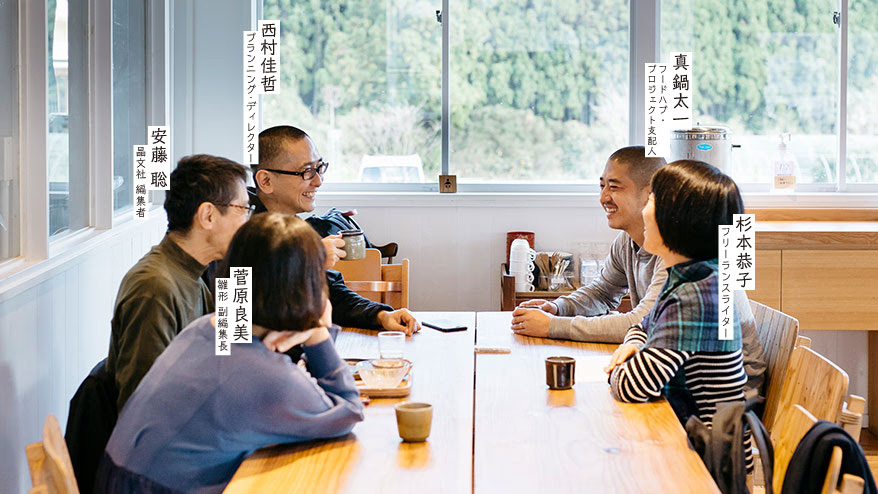Following on from the first part yesterday, this is the second part of a roundtable discussion on the "musicality of writing" that took place overnight in Kamiyama Town, Tokushima.
The morning after we had segued from the drinking party into a roundtable discussion on "writing style," the same faces gathered again at Kamaya.

After everyone had calmly finished their breakfast, Nishimura Yoshitetsu said, "Well, let's get started," and switched the atmosphere to a round-table discussion.
This time, Nishimura spoke about "what is writing" and "what does a writer do when writing," using Manabe Taichi's articles and Kawauchi Ario's essays, which are serialized in " Web Cooking News ," as topics.
The opinions of the two editors, who occasionally speak out, are also worth paying attention to. This is a "record" that we would like to deliver to all writers, especially those who are struggling with writing.
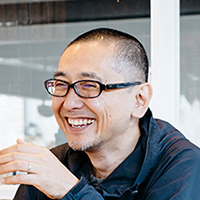
Speaker: Yoshiaki Nishimura Profile :
After working in the architectural field, he is now active in three areas: creating, writing, and teaching. For the past two years, he has been devoted to his work with the Kamiyama Tsunagu Corporation, which he established with the town of Kamiyama.
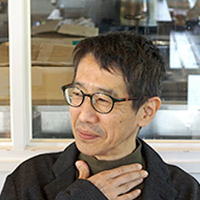
Speaker: Satoshi Ando Profile :
Book editor. After working at Shoeisha, Shobunsha, Basilico, and Gijutsuhyoronsha, he returned to Shobunsha in 2013. He also worked on Yoshiaki Nishimura's debut novel, "Make Your Own Job."
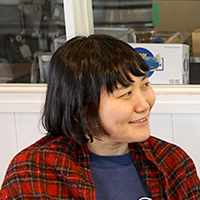
Speaker: Yoshimi Sugawara Profile :
Web magazine editor. After working as an editor for the magazine "ecocolo," he is currently the deputy editor-in-chief of the web magazine "Hinagata," which aims to set "a new standard for migration."

Author: Kyoko Sugimoto Profile :
Freelance writer. Since the fall of 2016, she has been serializing "Daughters of Kamiyama" in "Hinagata," an interview series with women who have moved to Kamiyama. This time, she conspired with Manabe to hold a roundtable discussion.
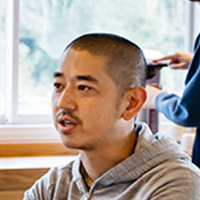
Interviewer: Taichi Manabe Profile :
He is the head of the Monosus Production Department. Since April 2016, he has also served as COO of Food Hub Project Co., Ltd., which was jointly established by Kamiyama Town and the Kamiyama Tsunagu Public Corporation.
Nishimura-san talks about writing for the first time
 Manabe
ManabeWhen you started writing "Jibun no Shigoto wo Tsukuru (Owner's Work ) (Shobunsha/Chikuma Bunko)," you weren't a writer. But you started writing, and you're still writing now. And the other day you said, "Writing is like music."
Today, I would like to take another look at the musicality of Nishimura's writing.
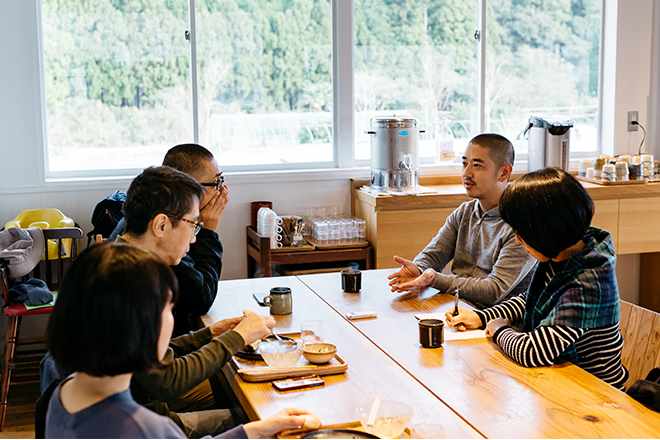
 Nishimura
NishimuraI understand. Well, sometimes I get requests to learn how to write. You do interview workshops, don't you? They only teach listening, not writing.
But, when it comes to writing, how should I put it...
I've been really self-taught, and writing isn't something I've really delved into. Also, writing style is something that's very physiological, so it's hard to put into words. So, I haven't done it for a while, but today I'm going to talk about writing for the first time.
 Manabe
ManabeI'm so sorry! Thank you in advance.
 Nishimura
NishimuraMoreover, speaking in front of two editors is a huge pressure. I said that if Manabe-san wanted to get something out of writing, it would be good if the two of them came and we all talked, but I didn't hear that it would be an article.
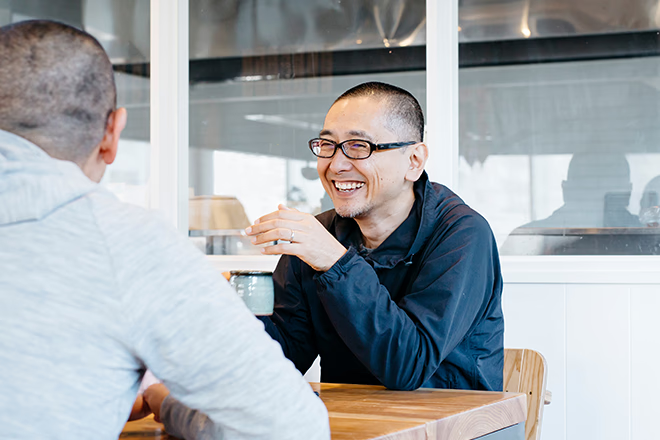
 Manabe
ManabeI thought everyone would want to know about this. Are you a little angry...?
 Nishimura
NishimuraNo, I'm not angry. Well, last night when I got home I read Manabe's serial on "Web Cooking News". I want to be able to write this article more comfortably and better, right? I'm going to email everyone the URL for the second part of "Small Food Policy in Progress" titled "Opening up the possibilities of chefs to society" . Please open it on your smartphone and take a look.
 Manabe
ManabeI never thought that they would talk about my writing... (sweat).
Reading a sentence = dropping the needle on a record
 Nishimura
NishimuraI can read Manabe's "Web Cooking News" and I think it works properly. I can't read it and say "this would be better", because I'm not a master of writing. But I can say "what I would do if I were you". Please listen with that in mind.
 Manabe
ManabeYes, please.
 Nishimura
NishimuraLet's get specific. The first part of "My title."
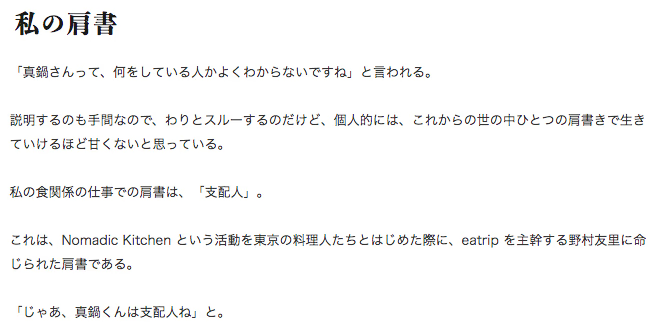
From http://r-tsushin.com/people/innovator/manabe_taichi2.html
 Nishimura
NishimuraIn the opening line, "People say, 'I don't really know what Manabe-san does,'" I would change it to "Manabe-san is..." because it is self-evident that the writer of this sentence is Manabe-san.
Also, I think it's more interesting to start with a line like, "I don't really know what he does for a living," because it gets the reader thinking, "Huh? What are you talking about?"
 Manabe
ManabeMr. Nishimura, you write your sentences while taking into account the other person's way of thinking.
 Nishimura
NishimuraYes. It's like we're creating the activity in our heads and hearts together. Writing is like a record. When we "read" it, the needle drops and the music we wrote plays in the reader's head and heart. At that moment, a certain "feeling" is born. I think that by writing, we create that "feeling."
 Manabe
ManabeAren't we writing because we have something we want to communicate?
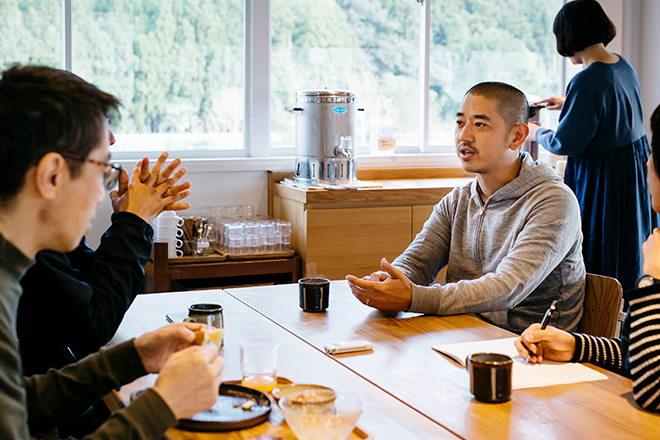
 Nishimura
NishimuraI think that a sentence has both a semantic world and a sensory world. To become a song, you need a sensory world that plays a melody. If you just want to know the meaning, it's enough to just look at the lyrics card. For example, bullet points. If you just want to convey the content, it doesn't have to be a song (sentence).
If you have a "physical" attitude towards writing, you can write it.
 Nishimura
NishimuraWhat do you think so far, Ando?
 Ando
AndoAt the beginning of " Literary Theory (Iwanami Bunko)," Natsume Soseki says, "F means a focal impression or idea, and f means the emotion attached to it." If you are moved by reading a piece of text, you need more than just the information. It's only when the information is combined with a sense that it can be "communicated."
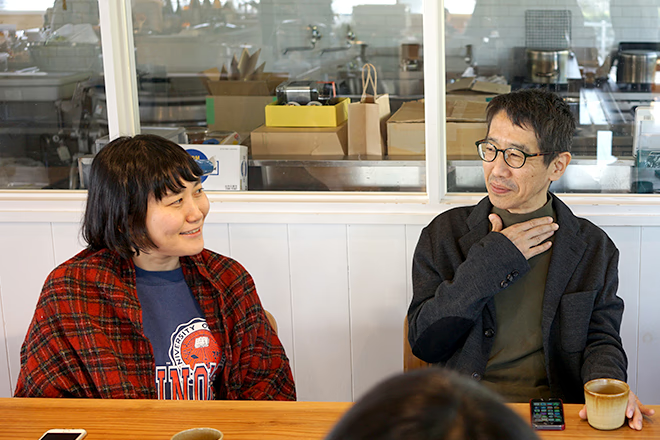
 Nishimura
NishimuraYes. I think that when people read a piece of writing, they receive both content and a feeling.
After the Great Hanshin-Awaji Earthquake, many people wrote about their experiences. The writing was done by amateurs, so there are many problems with the composition, such as too many kanji and too long sentences. But you can read them all the way to the end. That's because they are very knowledgeable about the subject and are full of their feelings.
 Manabe
ManabeSo on the other hand, there are sentences that lack the sensory element, the added element.
 Nishimura
NishimuraFor example, manuals and administrative documents do not contain any sensory elements.
Now, let's move on to the next sentence. "It's a pain to explain, so I tend to skip over it, but personally, I don't think the world will be so easy that you can live with just one title." The sound "no" appears five times. That's a lot, isn't it?
 Manabe
Manabesurely.
 Nishimura
NishimuraIf it were me, I would adjust it by changing "no" to "wo" or "ga."
Just like a song, there are not just lyrics, but also the music, the arrangement, the way of singing and performing. So, if the same sound comes up over and over again and the song becomes monotonous, the strong emotions I feel are not reflected in the writing.
Manabe-san, are there any sentences that you dislike? Any sentences that make you say, "I hate this, so I can't read it anymore."
 Manabe
ManabeThere are quite a few. There are books where you read a few pages and then you think, "I can't read this."
 Nishimura
NishimuraIf you are clear about what is "wrong," you will know the direction you want to go. It means that you have a sense of humor about writing, so I think you can write it. However, at this point, I haven't done much revision. Or maybe I haven't found the points that need revision yet.
Revision is the process of "polishing a sentence"
 Manabe
ManabeWhat exactly do you mean by proofreading?
 Nishimura
NishimuraSome people change the grammar of sentences, or break up long sentences with punctuation or line breaks to create rhythm. Some call this "Kanna-kake". I enjoy it when I start Kanna-kake, and I want to keep going. I submit a manuscript once, then make some more corrections... and editors get annoyed. Even after the book is published, I want to make some changes. On the other hand, there are also writers who write their books in one go with a fountain pen.
 Manabe
ManabeFor people who are truly talented and can play the instrument, this may be the best option.
 Nishimura
NishimuraThe key is what method can best convey your own sensations and emotions.
 Sugawara
SugawaraI think that what Nishimura means by "planing" does not just mean tidying up the text nicely, but also the task of creating a sense of distance between the text and the reader.
I write a lot, create the heart, or the core of the text, and then think about who I want to read it. I think it's a really fun task to create a relationship with the reader while thinking about the overall structure. It's like I'm finally getting closer to the feeling that "I'm writing it."
 Nishimura
NishimuraThat's right!
 Manabe
ManabeThere are steps to this. First, write out the core of the text, then adjust the sense of distance. In my case, I write quickly and then submit the text without having time to refine it.
 Sugawara
SugawaraIt's not a task that takes that much time, and it's necessary. If you don't do it, it doesn't feel like you've written anything.
 Manabe
ManabeThat's tough! (laughs)
How do you create a sense of distance with the reader?
 Nishimura
NishimuraNext, I would like to talk about the sense of distance from the reader. To put it bluntly, Manabe's writing is, how should I put it, um...
 Manabe
ManabePlease feel free to give it a go.
 Nishimura
NishimuraThis may sound rude, but I feel like Manabe has the writing on his side.
 Manabe
ManabeIt feels like there's a piece of writing next to me...
 Nishimura
NishimuraSomeone once said to me, "Don't Hayao Miyazaki and Michael Jackson come right up to your face?" and I thought, "I totally get it!" Indeed, those guys come right up to the audience. It's not like they're just messing around with the creators and saying, "Well, it's okay if you come."
 Manabe
ManabeIn my case, does this mean that both the writing and I are distanced from the reader?
 Nishimura
NishimuraRegardless of how Manabe is normally, when it comes to writing, there isn't much emotion or feeling in it. Rather than wanting to share it with others, it feels more like explaining something and asking, "Well, can you read it?"
 Manabe
ManabeWell, I think that's how it feels. I wonder? It doesn't come from within me. I think it's the result of me having people subscribe to my thought process.

 Nishimura
NishimuraWhen you write down your thoughts, they become explanatory, and the writer becomes bored. In my case, at least. It's easier to write when you're touching on the places where your own senses are abundant. I write things like, "This isn't just about me," or "This is about a lot of people, isn't it?" I'm not on the level of Michael Jackson or Hayao Miyazaki, but I feel like I'm reaching out to everyone.
 Manabe
ManabeIt feels a little closer to the reader than the middle.
 Nishimura
NishimuraThis is just my feeling, but it's not something you force on them, but it's like saying, "Hey?"
 Ando
AndoIt will be easier to get your message across if you are conscious of things like the distance between you and the reader.
Some people write with the intention of getting closer to the reader, while others write monologues that thoroughly explore their own position. Are you looking at a neutral middle ground, or are you trying to reach the other person directly? I feel that the way you distance yourself from the reader is connected to the writer and the genre of the content you are writing.
Create a space in the text that "invites the reader"
 Nishimura
NishimuraSo, let's go back to Manabe's writing.
It starts with "I don't know what he does," then it's not like "I don't know myself," or "I know!". When Yuri Nomura of " eatrip " says "So Manabe is the manager," it makes sense after some thought. It's like the rocket has an extra two stages.
 Manabe
ManabeYes, yes. So it's okay to start with "My title is manager."
 Nishimura
NishimuraYes. Then, when Manabe is asked, "You're the manager, right?" he thinks, "Huh?" and the reader can follow along with him as he goes through the process of understanding the words "support" and "care" for him.
Before you arrived at the idea of being a "manager" in a different sense to your public image, many things happened and you had a movement going on inside of you, right?
 Manabe
Manabethere was.
 Nishimura
NishimuraThere's a lot of feeling in it. I think the writing captures the feeling of remembering back then, wearing a bow tie, and wondering, "What does it mean to be a manager?"
 Manabe
ManabeIt's included.
 Nishimura
NishimuraI can't write about things I don't feel well about. There's nothing to describe. That's because I have little experience. If I can see a lot of things and there are a lot of things that come into my inner world, like "those autumn leaves, those leaves, that sunlight," I can describe them as much as I want.
Last night, I was talking about "Why is Michio Hoshino so good at writing?" I think it's because he sees and feels so much that he has plenty to describe. Inviting people to a world that you know intuitively. I think that creating a shared space by guiding them is what writing is all about.
 Ando
AndoI think Hoshino's analogy is very easy to understand and a very important point.
Last night we talked about "perspective," but "how you see" is also important. Some people call it resolution, but people who can see at a higher resolution can write. What looks like just a black lump at low resolution can look like a completely different world at high resolution.
I think that depending on the perspective and resolution at which you look at something, there is the potential for a wide variety of ways to interpret or explain it.
Let's all appreciate the "musicality" of the text.
 Nishimura
NishimuraI would like to talk about another piece of writing. It is an essay by Aio Kawauchi titled " Eating in Paris (Gentosha Bunko)." Let me read the opening of the "Introduction."
On Sunday mornings, the bells of Saint-Germain Church ring out across the city.
At that time, I'm usually either eating a baguette and cafe au lait for breakfast, or still dozing off in bed.
"Is it time for the bell to ring already?"
As is my habit, I stare blankly down the path from the old wooden-framed window.
A waiter at a cafe stands at the entrance, waiting for customers. A woman with a small dog strolls along leisurely. A young tourist couple stops to unfold a map. These are the same scenes I have been looking at for years. And the same things come to mind.
Yes, yes, I live in Paris.
After recalling the strange events in life that we don't usually notice, we return to our normal daily lives, just like the many other Japanese who ended up in this town.
-- Kawauchi Ario (author), " Eating in Paris ," Introduction, page 5, Gentosha, 2010I think it's natural and good! This sentence clearly expresses "music." The line breaks are well-used and the beats are well-timed. First, let's look at the endings.
On Sunday mornings, the bells of Saint-Germain Church ring out across the city.
At that time, I'm usually either eating a baguette and cafe au lait for breakfast, or still dozing off in bed.
"Is it time for the bell to ring already?"
As is my habit, I stare blankly down the path from the old wooden-framed window.
A waiter at a cafe stands at the entrance, waiting for customers. A woman with a small dog strolls along leisurely. A young tourist couple stops to unfold a map. These are the same scenes I have been looking at for years. And the same things come to mind.
Yes, yes, I live in Paris.
After recalling the strange events in life that we don't usually notice, we return to our normal daily lives, just like the many other Japanese who ended up in this town."Crossing/being/looking down/waiting/walking/unfolding/the scenery/was/the same/it was/returning/in the same way."
If we look at just the vowels, it is "u/u/u/u/u/u/u/i/u/i/u/a/u/i."
It always ends with "u", right? It's rhythm. Rhyming words are fun, aren't they? They're really songs. After "ru/ru/su/ru/ru/ru", when you get to "i", "u", and "a", it feels like a window has opened and the sky has cleared up, doesn't it?
Then, there is a blank line, and then he continues with the next block, "When I think back, I never had any interest in Paris in the past. I imagined it to be a pretty but pretentious city." This time, the scenery changes to the world of "ta."
I asked her to read it as a fact check, because I wanted to share with her how it was sung as a piece of writing. When I show it like this, it may sound like a composition technique, but I don't think she does it technically.
 Manabe
ManabeIf you try to consciously imitate this in your design, it will probably end up being an unpleasant piece of writing.
 Nishimura
NishimuraI think this guy does it quite naturally. It's like a physiological thing.
Once you become your own person, your writing style will emerge.
 Nishimura
NishimuraMy musician friends all say, "I can teach you how to structure and arrange a song, but I can't teach you how to compose a song." For example, you can learn about the interesting structure of a song, such as an A melody, a B melody, and then a C melody. I think there's a lot we can talk about when it comes to arranging, but I don't think there's much we can say about melody.
You can tell it's Burt Bacharach's song after just one bar. You can also tell it's Murakami Haruki's novel after just one page. You know, his writing style is like a road.
 Manabe
ManabeHmm, is it a road?
 Nishimura
NishimuraNo matter where you turn on the Koshu Kaido, you know, "Oh, that's the Koshu Kaido." The Nakasendo also has that feeling of, "Oh, that's the Nakasendo." No matter where you turn on National Route 1, it's National Route 1. Old highways have that feeling.
 Ando
AndoWow.
 Nishimura
NishimuraEach field has its own unique style. I think writing is similar to that. It's called "style" so it's a "body." So, this cannot be taught, but there are ways to absorb it. One way is to "copy."
Writers who like to train will even copy out an entire book by someone whose writing style they like. I don't do that, but I've been listening to music instead, so I feel like I get inspiration from that. I also read more manga than books. Manga storyboards are well-made as design products in terms of how they convey meaning and feeling. Old girls' manga are especially wonderful. Writers like Oshima Yumiko, Iwadate Mariko, and Hagio Moto...
 Manabe
ManabeI didn't know that they had expanded into shojo manga as well.
 Nishimura
NishimuraI was immersed in music and manga, so I get inspiration from that. Masataka Baba of Open A Co., Ltd. said that he reads the sports magazine " Number " before writing. He likes soccer, and the articles in "Number" really get him going, so he gets really energized to write. Also, Gavin Ito just starts writing whatever he wants, and then he gradually gets into the groove and feels like "I've written it!" He said that he writes about 2,000 characters and then throws away the first 1,000 characters.
I think everyone has different ways of becoming their own body.
Discover the "VOICE" that suits your body
 Ando
AndoListening to what you just said reminded me of the American saying, "If you can find your own voice, you can write." Each voice is probably very much related to one's own body, and there seems to be some overlap between music and text.
 Sugawara
SugawaraI can understand why you wrote this after reading "Number". Sports is a physical expression, so I think it puts into words things that cannot be seen, like movement and momentum. It's emotional.
I don't copy the whole book, but I do copy parts of sentences I like. It really helps me understand "why I like this sentence" and "why I can't write it." It's important to realize what you can't do, and I think it also leads to the skill of "I want to do this more."
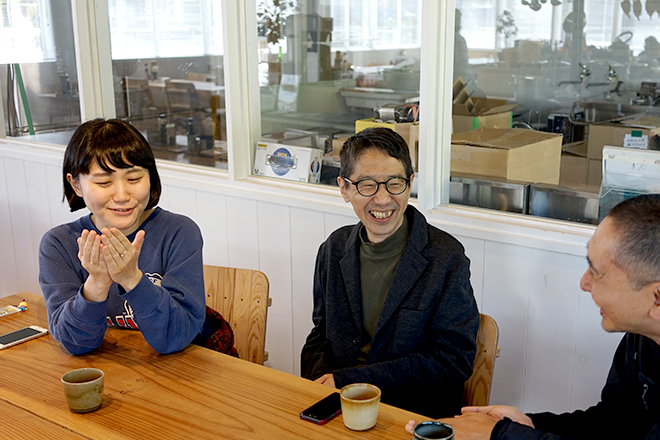
 Nishimura
NishimuraOnce you can see it, you will be able to see your own writing and correct it. Right now, Manabe-san has a great eye for design, editing, presentation, space, service, and so on. I think he adjusts various things naturally.
If you still can't see it when it comes to writing, I think you can try to read your favorite writing with the mindset of copying it down. Where are the line breaks, how are the punctuation marks used, how long is a sentence, how many kanji are used? If you read while paying attention to such things, I think you will start to see it.
 Sugimoto
SugimotoI also think it's good to read out loud. When you read out loud, you can understand the sentence as sound, not the meaning. I also read out loud the manuscripts I write before submitting them. I think it makes it easier to find things like monotony in the endings of words.
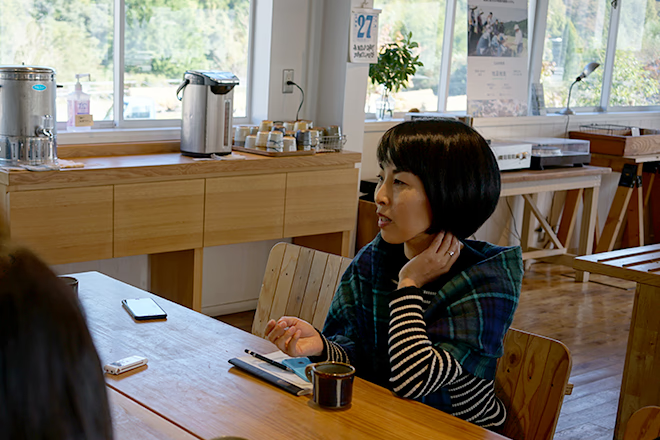
 Sugawara
SugawaraYou can see straight away what's odd.
 Ando
AndoMany people finish by reading aloud. It seems that people who do translations also read aloud.
 Nishimura
NishimuraI see, I'll try that next time.
 Manabe
ManabeThank you everyone.
Writing helps me organize my thoughts and see what I need to do next. That's why I want to keep writing, but it's pretty tough. I'll try reading out loud. I'll also try to use a planer properly.
Thank you everyone!
Wow, it was a truly luxurious time. Not just the round-table discussion, but the entire time from transcribing to writing the manuscript. Is there any job that is as rewarding for a writer as this? (Including the super-heavy pressure of having the manuscript checked by Nishimura-san and two editors afterwards!)
Writers write thousands, even tens of thousands of words every day. But surprisingly, they don't put their own "writing" into words. They rarely talk about the theme of "writing," such as "What does it mean to write?" or "Why do we write?"
It's not just writers. Nowadays, everyone writes something and sends it to someone on their smartphone, computer, email, LINE, or messenger. Although the number of "writers" is increasing, I think there is a lack of opportunities to think about "writing".
Depending on the words we use in our daily lives, the world can be beautiful and kind, or cruel and violent. In other words, words create our world. I believe that "What kind of words do I want to weave?" is linked to "What kind of world do I want to live in?"
The keyword in Manabe's series "Small Food Policy in Progress. Part 4: Post-Truth, Post-Food," which was published after the roundtable discussion, was "everyday food." I hope that reading this roundtable article and Manabe's series will make you think about "everyday words" and "everyday food."
"Small Food Policy" in progress. Part 4: Post-Truth, Post-Food"
http://r-tsushin.com/people/innovator/manabe_taichi4.html
bonus
Nishimura said, "Murakami also writes at length about the musicality of writing, somewhere. I think it comes up at length in the book of interviews with Ozawa Seiji, although I haven't read it!" So I immediately read " Talking about Music with Ozawa Seiji " (Ozawa Seiji x Murakami Haruki, Shinchosha).
Nishimura-san, as you guessed, there was an interlude called "The relationship between writing and music"! I'll just quote a little bit from it as a report.
Rhythm is created by combining words, sentences, paragraphs, hard and soft, light and heavy, balanced and unbalanced, punctuation, and tones. It's like music.
Seiji Ozawa and Haruki Murakami (authors) , Talking about Music with Seiji Ozawa, Shinchosha, 2014
